Finches Not Eating Thistle Seeds: An Insight
When it comes to the fascinating world of avian dietary behaviors, few instances are as intriguing as finches turning their beaks away from thistle seeds. Once considered a staple in a finch’s diet, thistle seeds have recently found themselves in the unusual position of being ignored. This shift in food preference raises several questions about finch dietary habits and their adaptability in changing environments.
Finches, known scientifically as members of the family Fringillidae, are small passerine birds noted for their seed-eating habits. According to a 2017 report in the Journal of Avian Biology, seeds make up approximately 90% of a finch’s diet, and among them, thistle seeds have long been a preferred choice.
This sudden aversion to thistle seeds, an energy-rich food source, may appear perplexing to bird enthusiasts and ornithologists alike. However, it’s an opportunity to understand the dynamic dietary preferences of these birds better and to explore the complex factors influencing these behaviors.
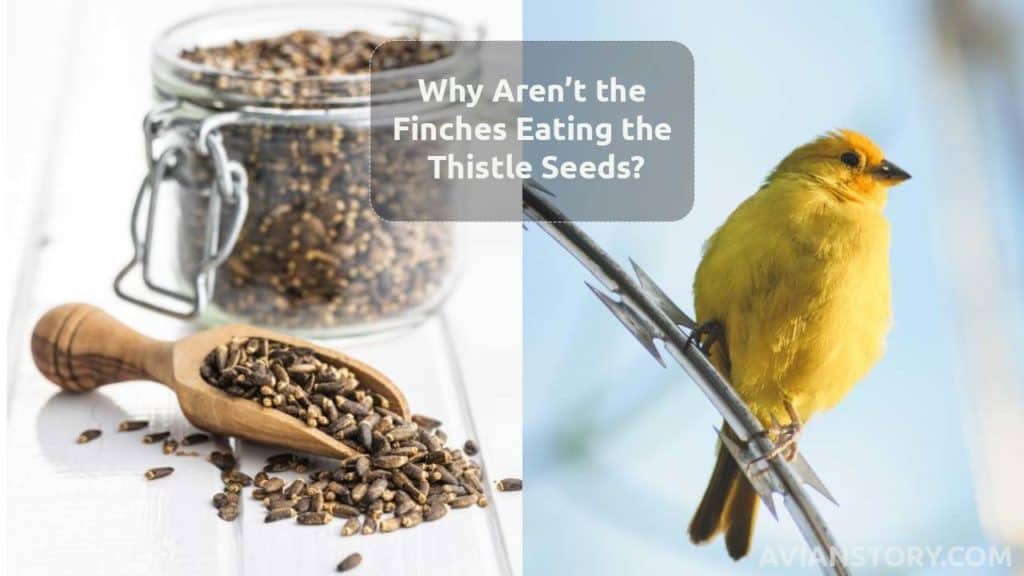
What Kind of Seeds Do Finches Generally Prefer?
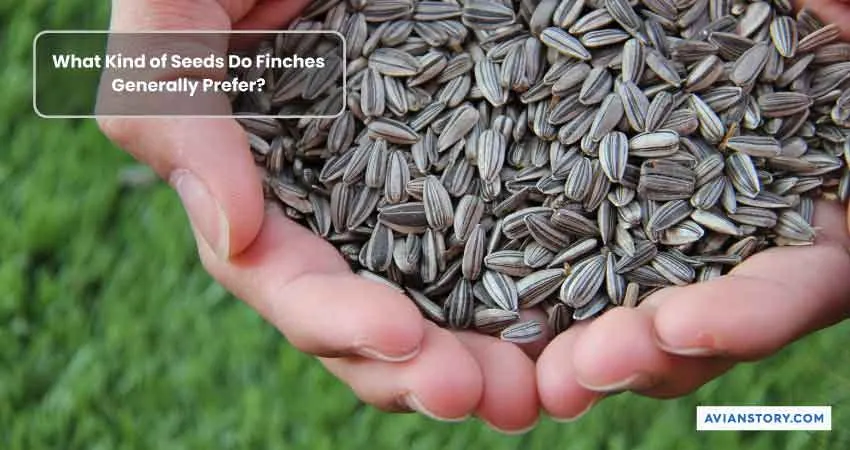
Among the fluttering world of finches, seed preferences can differ dramatically. Let’s dissect these preferences to understand why they might be turning up their beaks at thistle seeds.
Finch Feeding Preferences
In the wild, finches are predominantly granivorous, feasting on a variety of seeds. Sunflower seeds, millet, and canary seeds are some common choices, favored for their nutritional value and easy accessibility.
Finch Diet
A typical finch diet includes an array of seeds, fruits, and insects, providing a balance of proteins, carbohydrates, and fats essential for their survival. However, as stated in a 2017 study published in the Journal of Avian Biology, finches exhibit a strong preference for seeds over other food types, making up to 90% of their diet.
Common Seed Preferences
Interestingly, not all seeds are created equal in the eyes of a finch. For instance, House Finches are often seen gorging on sunflower seeds, while American Goldfinches exhibit a marked preference for thistle seeds, a tendency also observed in Purple Finches.
Thistle (Nyjer) Seeds and Finches: An Affinity Questioned
While thistle seeds are often the go-to choice for finches, recent observations point towards an aversion. Let’s unravel the causes behind this unexpected behavior.
Thistle Seeds as a Common Choice
Thistle seeds have long been recognized as a favorite among finch species. Rich in proteins and fats, they serve as an excellent energy source, especially during harsh winters when other food sources are scarce. Moreover, their small size and soft hull make them easily consumable for finches, as noted in a report by the Cornell Lab of Ornithology.
Geographic Variations
Despite their apparent love for thistle seeds, finches in some regions seem less inclined towards these seeds. This could be due to the availability of other preferred food sources or variations in local thistle seed quality.
Could the Quality of Thistle Seeds Be Deterring Finches?
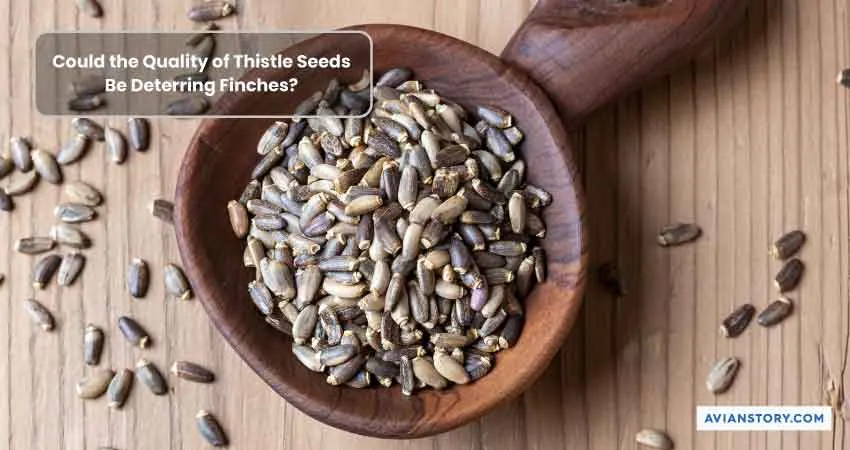
The quality of seeds plays a significant role in finch feeding habits. Subpar seeds can deter finches and might explain their recent avoidance of thistle seeds.
Importance of Seed Quality
Just like us, birds too care about their food quality, making it an influential factor in their feeding habits.
Determining Seed Quality
Birds use various cues to gauge seed quality. For example, a study in the journal Animal Behaviour suggests that birds can differentiate seed quality based on color, size, and even smell. Moldy or rotten seeds are typically shunned in favor of fresher ones.
Seed Quality and Finch Feeding Habits
As per the American Bird Conservancy, if the quality of seeds is compromised, it could result in lower consumption. Hence, if your thistle seeds are not being consumed, it might be worth checking their quality.
Factors Influencing Thistle Seed Quality
Thistle seed quality can be affected by several factors, including weather and storage conditions.
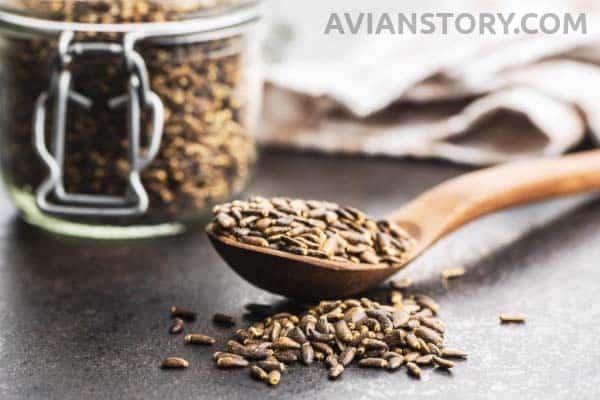
Weather Impact
Severe weather conditions can impact the quality of thistle seeds. Prolonged rainy periods can lead to seed spoilage, making them less appealing to finches.
Storage and Age
The way you store your seeds can also impact their quality. Thistle seeds stored in damp conditions are prone to mold, which can deter finches. Moreover, as seeds age, they lose their nutritional value, making them less appealing to our feathered friends.
Is the Presence of Predators or Environmental Disturbances Affecting Finch Feeding Habits?
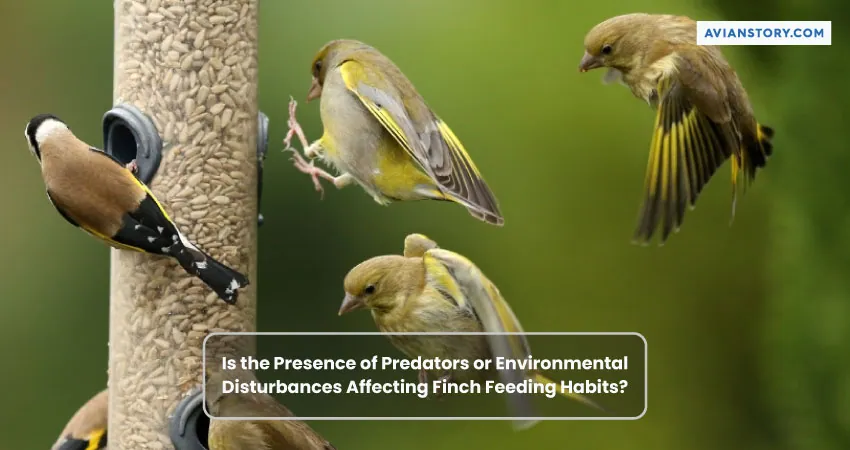
Environmental disturbances, including predators and human activity, can significantly influence finch feeding behavior, possibly explaining their aversion to thistle seeds.
The Role of Predators
Finches, like all birds, live with the constant threat of predation. Their feeding habits are often dictated by this danger.
Common Predators and Their Influence
Cats, hawks, and larger birds often prey on finches. The presence of these predators near feeding areas can discourage finches from feeding, as observed in a study in The Auk, an ornithological journal. Therefore, if your thistle seed feeder is in a location frequented by predators, finches may avoid it despite the availability of their favored seeds.
Predatory Signs
Even signs of predation, such as feathers or remains of other birds, can scare off finches. Consequently, maintaining a clean and safe feeding area can help attract finches back to the thistle seeds.
Environmental Factors
A number of environmental factors can also deter finches from feeding.
Noise and Human Activity
Finches are sensitive to noise and disturbances. Areas with high human activity can deter finches from feeding, according to a report in Global Change Biology. Thus, if your thistle seed feeder is in a bustling area, it might explain the finches’ avoidance.
Changes in Habitat and Food Sources
Habitat destruction and changes in native food sources can force finches to adapt their feeding habits, as per a study in Conservation Biology. If local vegetation changes have resulted in new food sources, finches might be forgoing thistle seeds for these alternatives.
Can Changes in Finch Health or Nutritional Requirements Explain Their Aversion to Thistle Seeds?
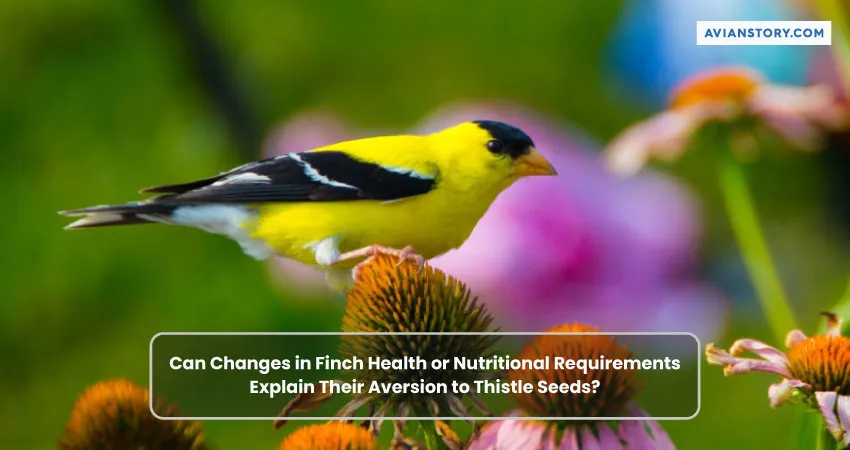
Changes in health or nutritional needs can dramatically influence a finch’s feeding behavior. Could this be the reason for their thistle seed avoidance?
Health Conditions Impacting Finch Feeding Habits
Just like us, finches can have off days too. Certain health conditions can affect their appetite and feeding habits.
Common Health Issues
Health issues such as parasitic infections, diseases, or injury can make finches less inclined to eat. For instance, avian pox, a disease documented by the National Wildlife Health Center, can cause lesions in the mouth, making eating a painful ordeal.
Signs of Ill Health
Notice a finch that’s less active, has ruffled feathers, or is losing weight? These could be signs of ill health, which might explain their decreased interest in thistle seeds.
Nutritional Needs of Finches
Finches’ nutritional needs can change with age, season, and life events like mating or nesting. These changes can influence their feeding habits.
Life-stage Specific Nutritional Requirements
Nutritional needs differ across a finch’s life stages. For instance, fledglings need more protein for growth and development, making them more likely to opt for insects over seeds. In contrast, adult finches during non-breeding periods prefer seeds for their high energy content.
Seasonal Variations
Finch diet also varies with seasons. During winters, when insects are scarce, finches rely heavily on seeds. But come spring, they might ignore seeds, including thistles, in favor of readily available insects and sprouts.
Are There Other Food Sources Available That the Finches Might Prefer Over Thistle Seeds?
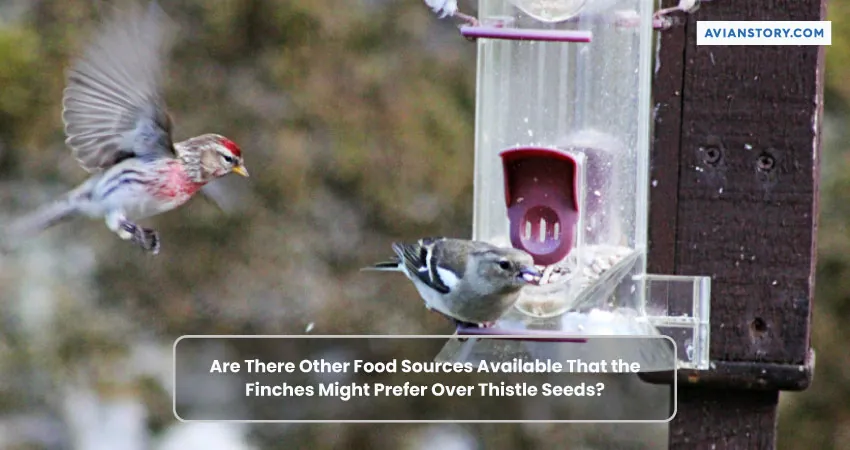
Availability of alternative food sources can also explain finches’ aversion to thistle seeds.
Seasonal Availability of Other Food Sources
Just as our diet changes with seasons, so does that of finches. They might be forgoing thistle seeds in favor of other seasonally abundant foods.
Common Seasonal Foods
Finches’ diet includes berries, fruits, and insects, whose availability varies with the season. For example, during spring and summer, the abundance of insects and fresh fruits might steer finches away from thistle seeds.
Impact of Seasonal Food Availability
Seasonal food availability can significantly affect finch feeding preferences. A study in Behavioral Ecology noted that birds tend to diversify their diet with the availability of new food sources. Hence, finches might be skipping thistle seeds for other enticing options.
Competition with Other Bird Species
Inter-species competition can also influence finches’ feeding habits.
Competition for Thistle Seeds
If other birds are also feeding on the thistle seeds, finches might be getting outcompeted. Larger and more aggressive birds can deter finches from feeders, as noted in a study in the Journal of Animal Ecology.
Alternative Food Sources
To avoid competition, finches might opt for other food sources. If these alternatives are equally nutritious and less contested, finches might prefer them over thistle seeds.
How Can We Encourage Finches to Feed on Thistle Seeds Again?
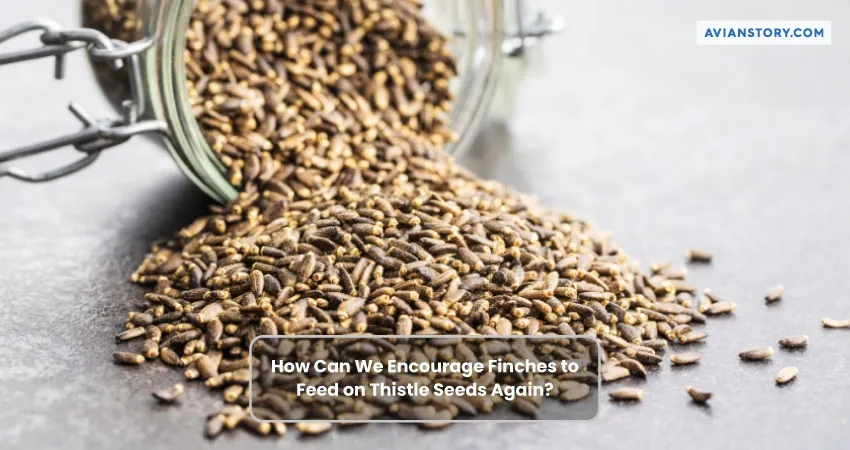
Getting finches to resume feeding on thistle seeds involves improving their appeal and creating a safe and encouraging environment.
1. Strategies to Improve Thistle Seed Appeal
There are several strategies you can adopt to make thistle seeds more appealing to finches.
Maintaining High Quality Seeds
Ensure the thistle seeds you offer are of high quality. Fresh, dry seeds free from mold or spoilage are more likely to be accepted. Regularly check and refresh the seed supply to maintain quality.
Presenting Thistle Seeds
The way you present thistle seeds can influence finches’ acceptance. Offering seeds in feeders that are easy to access and eat from can attract more finches. For instance, tube feeders with small holes are perfect for finches, as they allow them to cling and feed comfortably.
2. Creating a Safe and Encouraging Environment
To encourage finches to feed on thistle seeds, it’s important to create a safe and quiet feeding environment.
Placement of Feeders
Feeders should be placed in quiet areas, away from heavy human activity or predators. They should also be positioned near cover, like shrubs or trees, allowing finches a safe haven from potential threats.
Regular Cleaning
Regular cleaning of feeders can also encourage finches to feed more. Dirty feeders can harbor disease-causing organisms and deter finches. Therefore, ensure your feeders are cleaned at least once every two weeks.
In Conclusion: Unraveling the Mystery
While the finches’ aversion to thistle seeds can be perplexing, it can often be explained by changes in seed quality, environmental disturbances, health conditions, availability of alternative food sources, and competition. By being observant and responsive to these factors, we can hopefully encourage our finch friends to once again partake in their beloved thistle seeds.
Similar Posts:
Can Lovebirds and Finches Live Together? [Visit This Link]
Can Canaries and Finches Live Together? [Visit This Link]
Can Finches Eat Strawberries? [Visit This Link]
Can Finches Eat Dandelions? [Visit This Link]
Can Finches Eat Parakeet Food? [Visit This Link]
Can Doves and Finches Live Together? [Visit This Link]
